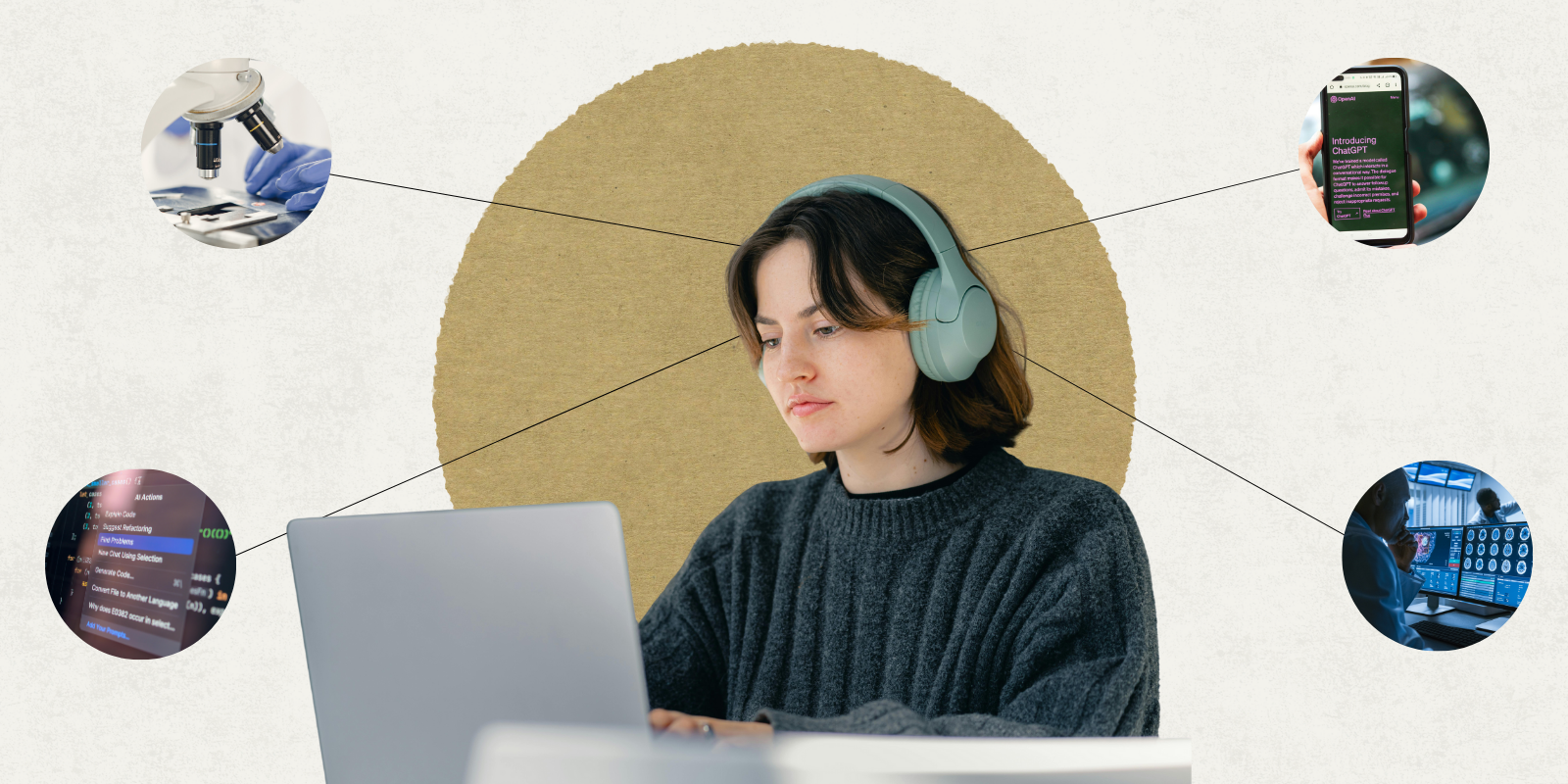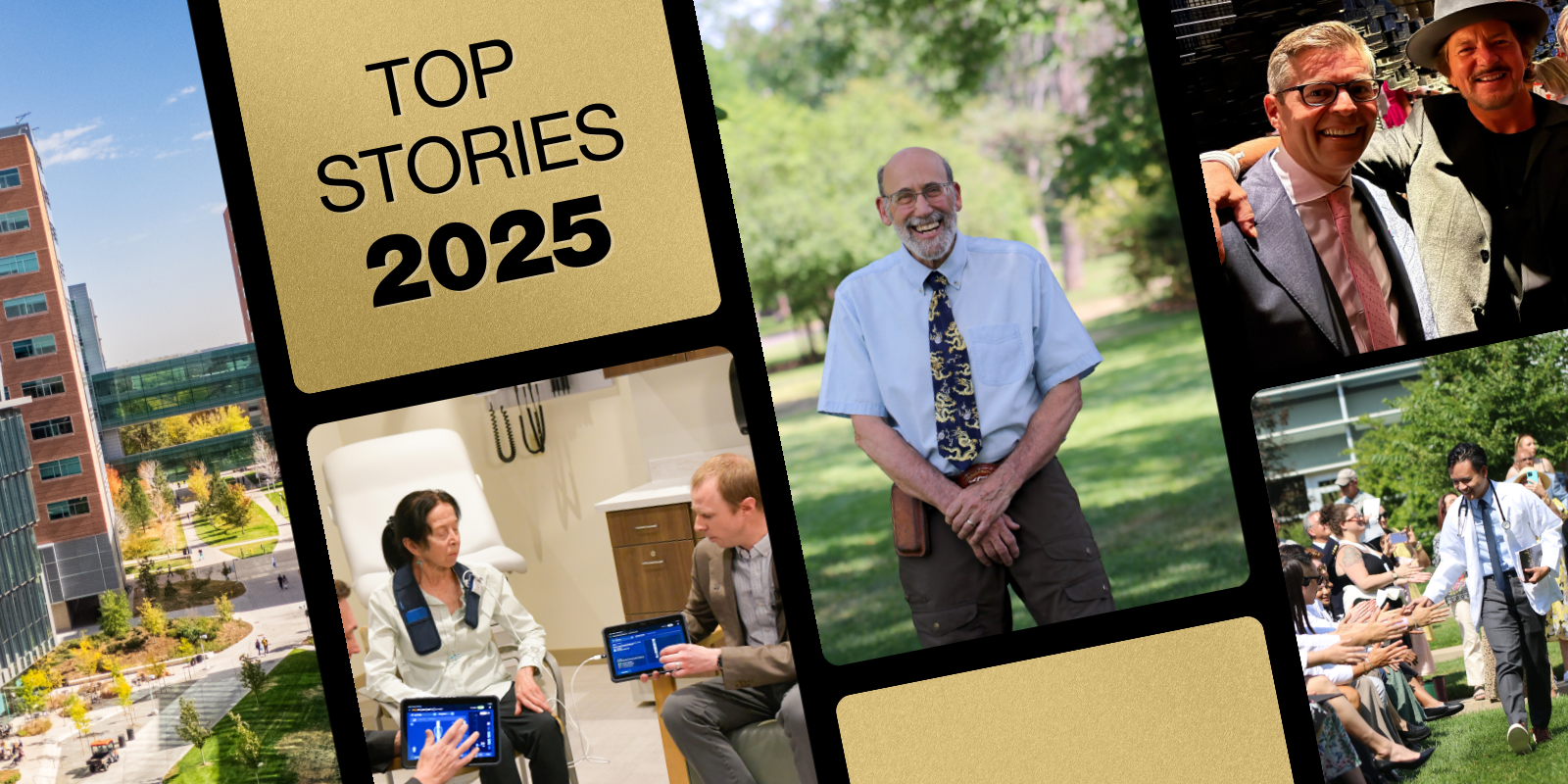Compared to his classmates, Match Day holds little stress for fourth-year medical student and Navy Ensign Anthony Smyth.
Smyth has been able to “ski guilt free” since December, when he participated in Military Match and learned he matched for his residency in orthopedics at Walter Reed National Military Medical Center, his first-choice program.
Even though he feels a sense of relief, he feels for his classmates as they anticipate Match Day on March 15.
“I felt confident leading up to Match Day, but nothing prepares you for that hour before you get that email,” Smyth says.
Gaining clarity on his future has allowed Smyth to pursue research he’s passionate about, and reflect on his medical school journey.
Medicine takes a hold
With a mother who was a family medicine physician, and an older brother completing his residency in anesthesiology at the Naval Medical Center Portsmouth, it was natural for Smyth to have an early interest in medicine.
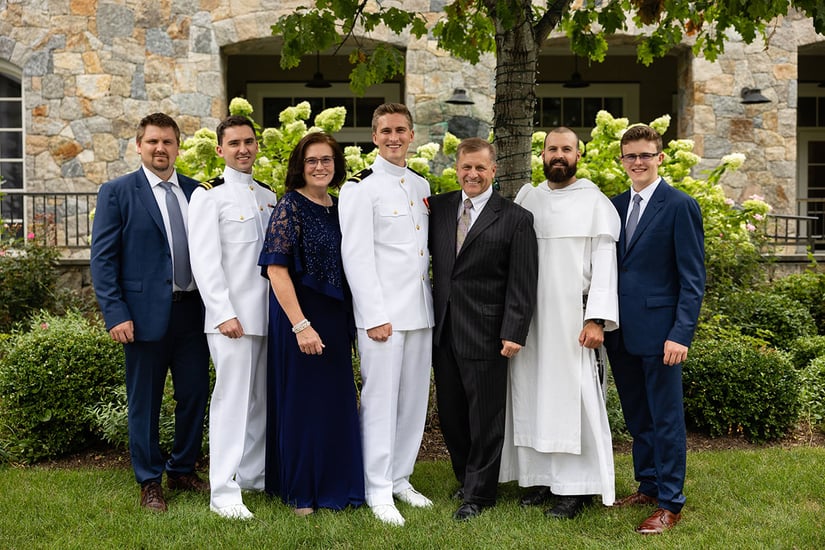
Anthony Smyth (center) with his parents and brothers.
Smyth initially planned to pursue a mechanical engineering degree at the University of Notre Dame, but he soon realized his passion for health science and medicine wasn’t fleeting. Still hesitant to fully commit to medical school, he switched his major to science-business, planning to go into health care consulting.
However, several experiences during his undergraduate degree renewed Smyth’s interest in pursuing medical school. He shadowed several physicians, especially orthopedic surgeons. He worked as an EMT at sporting events, held jobs at clinics over the summers, and spent time working at a nursing home.
“It was a pretty great experience to help work one-on-one with patients,” says Smyth, who enjoyed supporting patients with their day-to-day needs. “I found that pretty rewarding and a big piece as to why I returned to the field of medicine after starting in consulting.”
Smyth applied to medical school and was accepted to the University of Colorado School of Medicine to fully pursue his passion.
“I fell in love with the program here and everything about it, so it was a pretty easy decision to pick Colorado,” he says.
Thriving at CU
Smyth got involved in research and joined health-related organizations as soon as he arrived on the CU Anschutz Medical Campus, including the Catholic Medical Association. The organization helped Smyth meet other physicians and medical students in the Denver area who wanted to discuss medicine from a Catholic point of view.
“Medicine is about dignifying the human person and recognizing the dignity of every human person,” Smyth says. “If we approach every patient encounter with the idea that every person has an innate dignity despite their circumstance, it changes how we give care.”
It is this perspective that played a role in Smyth pursuing orthopedics as a specialty.
“As medical school went on, I kept thinking back to my experiences in the orthopedic operating room, the use of technology, and the ability to take someone who's experiencing a poor quality of life and bring them back to having a higher quality of life,” Smyth says. “That comes back to the mode of dignifying the human person and helping to bring the human body back to flourishing.”
Smyth was involved in research opportunities within orthopedics both at CU and during his rotations. He’s worked on studies at CU with the sports team on rotator cuff injuries and is currently working on a study about the effects of rotator cuff surgery on sleep.
He’s excited to continue his work when he begins his residency.
“I also helped out at Walter Reed with some projects there looking at different clinical outcomes after total knee replacement,” he says. “It has been pretty rewarding to begin research at my new institution.”
A desire to serve
Smyth’s decision to join the Navy has its origins in his family’s move to the United States from Canada just before he was born.
“Since my family moved to the U.S., I've had a deep-seated appreciation for all the opportunities that have been given to me here,” he says. This translated to a desire to serve and give back.
Smyth’s older brother attended medical school through the Health Professions Scholarship Program. Smyth decided to pursue the scholarship as well.
“I found it a good way to not only pay for medical school but also a way to serve at the end of the day and in a profession that I find very rewarding,” Smyth says.
Experiencing military medicine at Walter Reed National Military Medical Center, Naval Medical Center Portsmouth, and Naval Medical Center San Diego during his fourth-year away rotations helped Smyth reconnect with the reasons he decided to go to medical school in the first place.
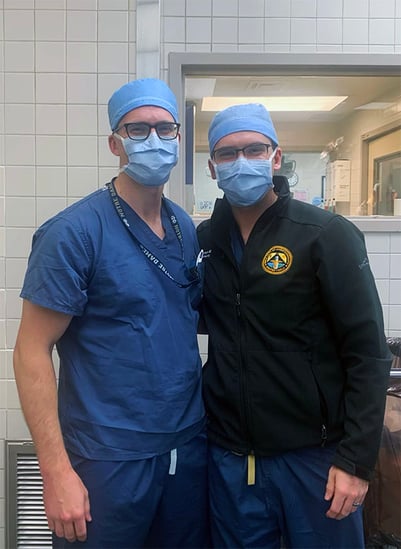
Anthony Smyth (left) with brother Lieutenant James Smyth, MD, at Naval Medical Center Portsmouth.
“I experienced how our role as physicians impacts soldiers and their families, and it invigorated in me the passion I had from day one of medical school,” Smyth says. “I want to be able to thrive while I'm in residency so I can become the best possible surgeon for soldiers and their families in the future.”
A community of support
When Smyth reflects on the people who have helped him get to where he is, the first name that comes to mind is his wife, Claren Smyth.
“It's not so much that I've been to medical school, but that we have been through medical school,” Smyth says.
His wife was always at his side, from traveling with him throughout the country for rotations, to handling the many responsibilities during his clinical year when he’d leave at 5 a.m. and not return until after dinner.
“Claren has been my rock that has supported me throughout all of this, and I hope I can pay it back to her one day,” Smyth says. He also thanked his parents and in-laws for their support throughout the process.
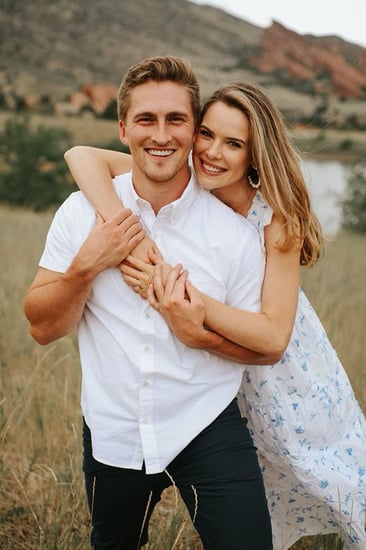
Anthony Smyth with his wife, Claren Smyth.
Along with his family, Smyth reflected on the mentors at CU that were major influences on his time in medical school. He appreciated the support of his advisor, Frank Scott, MD, professor of orthopedics, and Eric McCarty, MD, professor of orthopedics.
“Dr. Scott has been instrumental in in helping develop my application to orthopedics,” Smyth says. “And Dr. McCarty always had my back and he’s supported me through every challenge.”
One of the biggest challenges for Smyth, and something he describes as one of the most challenging years in his life, was his transition from the classroom to his clinical rotations at the CU School of Medicine Colorado Springs Branch.
“There are so many times in medical school where you feel like you know absolutely nothing and everyone around you knows so much more, but the way that the faculty instilled in us the confidence to be able to go into the clinical setting and perform was unlike any other type of support I've received throughout my academic life,” Smyth says. “I really appreciate the support of Dr. Jamie Baker (MD) and the rest of the staff.”
Along with mentorship from doctors, Smyth said his classmates and colleagues contributed to his success.
“I think my friends in this class are some of the most accomplished people I've ever met in my life, and I would not be here without them today,” Smyth says.


